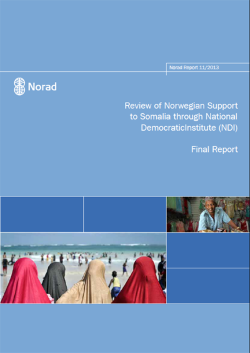Review of Norwegian Support to Somalia through National DemocraticInstitute (NDI)
About the publication
- Published: August 2013
- Series: Norad reports
- Type: Norad reports
- Carried out by: Scanteam
- Commissioned by: Norad
- Country: Somalia
- Theme: Governance and democracy, Conflict prevention and resolution, peace and security
- Pages: 58
- Serial number: 11/2013
- ISBN: 978-82-7548-705-4
- ISSN: --

This report is an independent review of Norwegian support to statebuilding, peacebuilding and democracy through National Democratic Institute (NDI) during the Transitional Federal Government of Somalia.The review covers the period November 2009 to the end of 2012.
The review was carried out by a team led by Vegard Bye, Scanteam, Oslo, and with Sagal Abshir, Somalia, as independent consultant.
The Somalia NDI Program aimed to build capacity in the Executive and the Parliament structures of the transitional federal government towards the establishment of a constitutional basis, aiming to make them “credible authorities”. Norway/MFA funded the Executive part of this while the USAID supported the organization´s work with Parliamentary development. In September 2011 NDI launched a new overall goal for the program supported by Norway: “to strengthen the ability of governing institutions at all levels to address citizen needs and incorporate citizens into democratic processes” with a stronger focus on bringing citizens into democratic processes.
The overall conclusion of the review is that NDI has played an important role in supporting the efforts to finalize what has been termed “the transition phase” in Somalia, defined as the approval of a provisional constitution and the selection (rather than election) of top federal authorities. The team writes that with all its flaws and shortcomings, it was an achievement in itself that all this happened within Somalia, different from all previous (post‑Barre) governments that were appointed at conferences held outside the country. But this alone is not sustainable neither for state‑building nor for peace‑building in Somalia. What has been achieved – with support of NDI, UNDP and others – will not hold without a very committed and probably long‑term follow‑up.
The root problem persists: it is obvious that most Somalis do not feel a sense of ownership to the current Provisional Constitution, nor to the Parliament or the Executive that was formed under it. To the extent NDI has contributed to the positive outcome, NDI has also been hampered by the same shortcomings as the domestic actors the organization has supported in this process: its dialogue partnership has been limited to a political and social elite mostly drawn from the South‑Central part of Somalia (to a certain extent involving Puntland representatives, but hardly at all legitimate representatives of Somaliland), very closely linked to clan politics and bargaining, still far away from involving the population at large through democratic means. That said, NDI does seem to be aware of this problem, and focuses a part of its programming on trying to involve civil society, youth and women’s voices in the political process.
